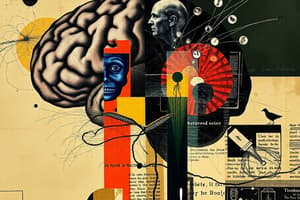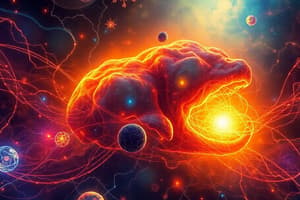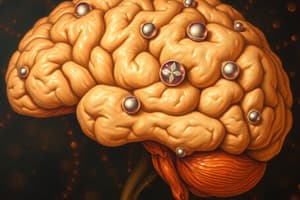Podcast
Questions and Answers
What is the limbic system?
What is the limbic system?
Controls our emotions.
What is the function of the amygdala?
What is the function of the amygdala?
Aggression center.
What does the thalamus do?
What does the thalamus do?
Sensory relay station.
What is the role of the hippocampus?
What is the role of the hippocampus?
What does the hypothalamus regulate?
What does the hypothalamus regulate?
What is the autonomic nervous system responsible for?
What is the autonomic nervous system responsible for?
What does Kluver-Bucy syndrome indicate?
What does Kluver-Bucy syndrome indicate?
What is the limbic system also known as?
What is the limbic system also known as?
What are the four parts of the limbic system?
What are the four parts of the limbic system?
Where is the limbic system located?
Where is the limbic system located?
What happens when the amygdala is stimulated?
What happens when the amygdala is stimulated?
What effect does the destruction of the amygdala have?
What effect does the destruction of the amygdala have?
How many thalami are there?
How many thalami are there?
Where is the hypothalamus located?
Where is the hypothalamus located?
What is the size of the hypothalamus?
What is the size of the hypothalamus?
What shape is the hippocampus?
What shape is the hippocampus?
How many of each part of the limbic system are there?
How many of each part of the limbic system are there?
Flashcards
What is the limbic system?
What is the limbic system?
A group of brain structures that control emotions, motivations, and memories. It's often called the "emotional brain."
What does the amygdala do?
What does the amygdala do?
The part of the limbic system primarily responsible for processing emotions, especially fear and aggression. It's like the brain's alarm system.
What is the function of the thalamus?
What is the function of the thalamus?
Acts like a central hub for sensory information from your sight, hearing, taste, smell, and touch. It directs the information to other parts of the brain so they can process it.
What is the role of the hippocampus?
What is the role of the hippocampus?
Signup and view all the flashcards
What does the hypothalamus regulate?
What does the hypothalamus regulate?
Signup and view all the flashcards
What is the autonomic nervous system responsible for?
What is the autonomic nervous system responsible for?
Signup and view all the flashcards
What does Kluver-Bucy syndrome indicate?
What does Kluver-Bucy syndrome indicate?
Signup and view all the flashcards
Where is the limbic system located?
Where is the limbic system located?
Signup and view all the flashcards
What happens when the amygdala is stimulated?
What happens when the amygdala is stimulated?
Signup and view all the flashcards
What effect does the destruction of the amygdala have?
What effect does the destruction of the amygdala have?
Signup and view all the flashcards
How many thalami are there?
How many thalami are there?
Signup and view all the flashcards
Where is the hypothalamus located?
Where is the hypothalamus located?
Signup and view all the flashcards
What is the size of the hypothalamus?
What is the size of the hypothalamus?
Signup and view all the flashcards
What shape is the hippocampus?
What shape is the hippocampus?
Signup and view all the flashcards
How many of each part of the limbic system are there?
How many of each part of the limbic system are there?
Signup and view all the flashcards
Study Notes
Limbic System Overview
- The limbic system is crucial for emotional regulation and processing.
- Often referred to as "the emotional brain," it comprises several key structures.
Key Components of the Limbic System
-
Amygdala
- Serves as the aggression center; activation triggers emotions like anger, fear, and anxiety.
- Damage can lead to Kluver-Bucy syndrome, characterized by diminished fear response and flattened affect.
-
Hippocampus
- Responsible for forming and storing long-term memories; critical for memory conversion from short-term to long-term.
- Damage affects new memory formation.
-
Thalamus
- Acts as a sensory relay for touch, hearing, vision, and taste; directs these sensations to the cerebral cortex.
- Smell is unique as it bypasses the thalamus.
-
Hypothalamus
- Regulates the autonomic nervous system (ANS), influencing bodily functions through hormone production.
- Size of a kidney bean; essential for controlling fight/flight and rest/digest responses.
Functions of the Autonomic Nervous System
- Manages physiological responses categorized as Fight/Flight and Rest/Digest.
- Involves hormonal control impacting stress responses and relaxation.
Kluver-Bucy Syndrome
- Results from damage or absence of the amygdala.
- Symptoms include hyperorality, hypersexuality, and disinhibited behavior.
Anatomical Location and Structure
- The limbic system is situated centrally in the brain, nestled between the two temporal lobes.
- Composed of two hippocampi, two amygdalae, two thalami, and two hypothalami.
Additional Facts
- The hypothalamus serves as the body's internal clock and thermostat.
- The hippocampus's shape resembles a seahorse.
- The thalamus plays a pivotal role in maintaining smooth bodily operations and directing sensory information like a switchboard.
Studying That Suits You
Use AI to generate personalized quizzes and flashcards to suit your learning preferences.



